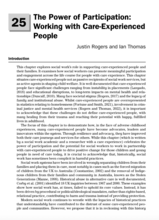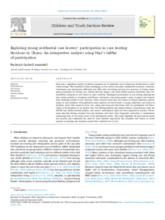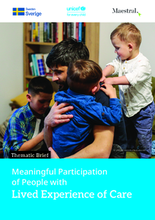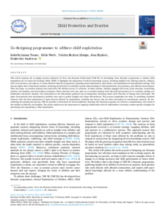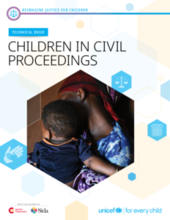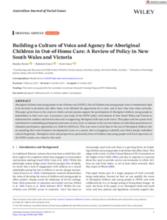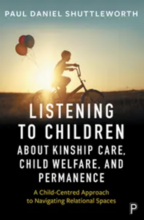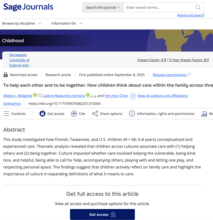Displaying 1 - 10 of 375
This article explores a pilot study in Italy in which care-experienced young people acted as co-researchers to examine perceptions of child maltreatment and state intervention, focusing on the co-construction of knowledge between survivors and academic researchers. It finds that peer-led research strengthens epistemic justice and professional practice by integrating lived experience with academic analysis and fostering relational, supportive spaces for young people’s voices in care proceedings.
This Chapter in the Book, Participatory Approaches in Child and Family Social Work explores the significance of advocacy in promoting the rights and well-being of children in care.
This chapter in the book, Social Work Reflections, explores social work’s role in supporting care-experienced people and their families. It examines how social workers can promote meaningful participation and engagement across the life course for people with care experience.
This qualitative study examines how young care leavers in Ghana are involved in decisions about their transition from residential care, revealing that despite national and international policy commitments, their participatory rights are often neglected. Findings show that care leavers frequently feel excluded or manipulated in key decisions, highlighting the need for more inclusive, rights-based approaches that recognize them as active partners in planning their post-care futures.
This brief outlines why and how the voices of children, young people and caregivers with lived experience of the care system should be central to child protection and care reform in Ukraine. The brief clarifies key concepts and levels of participation, emphasizing that meaningful engagement goes beyond tokenism and must ensure influence, feedback and accountability.
This article examines how Terre des Hommes Netherlands used a participatory co-design process to develop thematic programmes addressing sexual exploitation, child labour, and exploitation in humanitarian settings as part of its Listen Up! Strategy (2023–2030). By integrating insights from research, children, staff, and local partners through workshops, storytelling, and problem analysis, the process combined academic knowledge with lived experiences to create context-specific, evidence-informed interventions and Theories of Change.
This brief outlines how children engage with civil court processes—such as custody, guardianship, and adoption—and highlights the profound impact these proceedings have on their rights, development, and well-being. It identifies gaps in law and practice and calls for reforms to ensure children’s meaningful participation, child-friendly procedures, and consistent application of the best-interests principle.
This paper examines how effectively out-of-home care systems in New South Wales and Victoria, Austalia support the participation of Aboriginal children and young people in decisions about their own care. It highlights systemic barriers and calls for structural reforms to embed Aboriginal child and youth voices at every level, rather than relying solely on individual practitioners to promote participation.
This book unveils unique research on the transformative power of listening to children, exploring how they navigate family life and relationships. It offers fresh insights for theories, policies and practices in support of children’s welfare.
This study investigated how Finnish, Taiwanese, and U.S. children conceptualized and experienced care.

